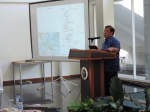AUN-ITB Summer Camp’s Student Visit: Exploring the Utilization of Bioresources in Cinanjung Village
By Anggun Nindita
Editor Anggun Nindita

SUMEDANG, itb.ac.id – Institut Teknologi Bandung (ITB) conducted another cross-culture and knowledge learning by inviting the participants of AUN-ITB Summer Camp (AISC) 2024 to visit a fostered location in the Cinanjung Village, Tanjungsari, Sumedang Regency, on July 18, 2024.
The activity was part of AISC 2024’s Subtheme 2 Agenda “Sustainable Bioresources Utilization and Management,” originating from the collaboration between the ITB School of Life Sciences and Technology (SLST), Faculty of Industrial Engineering (FIT), School of Pharmacy (SP), and ASEAN University Network (AUN).
In this program, students from numerous ASEAN countries were invited to study directly on the field to enrich their academic experiences. Focusing on the utilization and management of biological resources, participants had the opportunity to better understand the potential of local plants. These plants could be used in industry, especially the cosmetics industry and other creative businesses.
The Coordinator of Subtheme 2, Dr. Lili Melani from the ITB SLST, explained that the visit was part of a series of activities serving to inspire students to think creatively and apply design thinking.
“Students are tasked with exploring the village and the surrounding residential plantation lands. The objective is to make them knowledgeable about prospective local plants. One of our focuses is also for cosmetics manufacturing. We hope this activity will invigorate students to think creatively and generate new ideas that can be implemented in the utilization of the available resources,” stated Dr. Lili.

The Cinanjung Village was chosen as the location of visit because it had been actively managing the potential of its nature through the Women Farmers Association (shortened to KWT in Indonesian) Malati Asih. This group had been led under Ani Wiarni.
In her remarks, Ani expressed her eagerness to welcome the international students who had come from many ASEAN countries. Founded in 2010, KWT Malati Asih was known for its success in exploiting home gardens to grow vegetables and traditional medicines. Participants were invited to directly observe the garden management process, from planting to marketing the resulting products.
One participant from the Souphanouvong University (Laos), Noy Xaiyasan, showed her admiration for this activity.

“I think this activity is incredibly fun and useful. We have the chance to study a lot of plants here, including what kind of species are being planted, what their benefits are, and how they are processed. Although this isn’t included in my major, I sincerely hope to be able to bring this activity back to my own people so that I can introduce all this to them. As such, we can grow a lot of plants too and have a similar farm, helping them make products and money for their lives,” Noy revealed.
Through this visit, the students not only gained technical knowledge about the plants and their processing but also about the importance of collaboration and innovation in nurturing an impactful community. Hopefully, the program would create positive impacts to both the participants and the Cinanjung villagers by encouraging new ideas that could help increase their welfare, as well as give birth to a young generation that would be ready to face global challenges with creative and innovative solutions.
Reporter: Iko Sutrisko Prakasa Lay (Mathematics ‘21)
Translator: Ariq Ramadhan Teruna (Chemical Engineering ‘21)
Editor: Anggi Nurdiani (Management, 2024)

.jpg)
.jpg)
.jpg)
.jpg)
.jpg)


